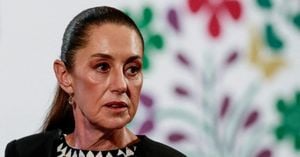Saudi Arabia has recently made headlines with its ambitious budget announcement, reflecting the Kingdom's continued drive for economic diversification and reform. The budget for the upcoming fiscal year is set at 1.14 trillion riyals ($304 billion), marking a notable increase from last year’s budget of 1.1 trillion riyals ($293 billion). This increase signals confidence in the country's economic resilience and its efforts to move beyond oil-dependency.
The Saudi government’s financial strategy emphasizes investments aimed at diversifying the economy as outlined by Deputy Minister of Finance, Dr. Hadeel Al-Sharif, stating, "The Kingdom is committed to enhancing the living standards of its citizens and ensuring sustainable economic growth." This sentiment echoes throughout the comprehensive plan integrated within the budget, which significantly emphasizes infrastructure, healthcare, and education sectors.
One of the key pillars of this year’s budget is the allocation of 277 billion riyals ($73.8 billion) toward development projects. This investment is expected to create thousands of jobs and stimulate local economies as part of the Kingdom’s Vision 2030 initiative aimed at reducing unemployment and fostering private sector growth.
Among the projected growth figures, the Saudi economy is expected to grow by 3.1% next year. The Minister of Finance, Mohammed Al-Jadaan, has expressed optimism about the Kingdom's recovery, stating, "Despite global economic challenges, we believe our strategic initiatives will support growth and strengthen our financial position." This projected growth is anticipated to be bolstered by the increase in non-oil revenues, which have already outperformed initial expectations, fueled by increases in taxes and investment income.
Focusing on its revenue strategy, the Kingdom plans to implement new tax regulations, including increased taxes on luxury goods and other non-essential items. This approach not only generates revenue but also aligns with the global trend toward sustainability and responsible consumption. “We aim to balance our fiscal responsibilities with our commitment to the citizens’ well-being,” remarked Al-jadaan.
Healthcare is another focal point of the new budget, with allocations reaching up to 118 billion riyals ($31.5 billion), emphasizing the Kingdom’s commitment to improve health services, particularly after the unprecedented challenges posed by the COVID-19 pandemic. Investments are directed toward modernizing facilities and enhancing the scope of local healthcare serviceable areas.
Education is also set to receive increased focus, with plans for substantial reforms aimed at boosting vocational training and enhancing educational programs. The Kingdom’s overarching goal is to equip its youth with the skills needed to thrive within the increasingly competitive global economy. The budget states, "Investing in education is investing in our future. We need skilled minds to drive our economic transformation."
Surprisingly, the new budget does not include the expected funding for several mega-projects initially slated for the upcoming year, leading to discussions on the potential prioritization of existing projects already underway. Analysts highlighted the importance of balancing ambitious new projects against ensuring current initiatives are effectively funded. This area will be watched closely by observers and stakeholders eager for clarity.
Considering the global economic environment, where many countries face uncertainty, the Saudi Arabian budget announcement stands out as both ambitious and strategic. It reflects the Kingdom's commitment to building resilience and enhancing its economic foundation. Initial reactions have been largely positive, with local economic experts noting the budget's alignment with Vision 2030’s objectives of fostering innovation and diversifying economic influences.
It remains unclear, though, how effectively the government plans to implement these initiatives and manage potential disruptions caused by external economic factors, including fluctuated oil prices. Nonetheless, the ministry remains confident, with Al-Jadaan affirming, "Our fiscal policy aims to navigate the economy through these challenging waters with prudence and foresight."
Investors and analysts will undoubtedly be keeping their eyes peeled for any signs of deviation from the established plans as the year progresses. The Saudi Arabian budgetary roadmap is not only historic but encapsulates broader aspirations - one driven by the vision of global competitiveness, economic independence, and growth.



